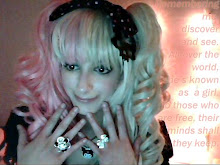
Synopsis: Mugen's a buck wild warrior - violent, thoughtless and womanizing. Jin is a vagrant ronin - mysterious, traditional, well-mannered and very strong as well. These two fiercely independent warriors can`t be any more different from one another, yet their paths cross when Fuu, a ditzy waitress, saves them from being executed when they are arrested after a violent swordfight. Fuu convinces the two vagrant young men to help her find a mysterious samurai "who smells of sunflowers." And their journey begins. This is a story about love, friendship and courage... NOT!
______________
Wow! This anime was excellent! I don't know if my reviewing skills can even do it justice. It was completely filled with win and awesome.
As many of you probably already know, Shinchiro Watanabe, who is famous for Cowboy Bebop, created and directed Samurai Champloo. The style the characters are drawn in is a little different, but it is still reminiscent of Cowboy Bebop. The background art and animation is excellent. Fight scenes are well "choreographed", and I love Mugen's fighting style, with dance moves thrown in to add to the hip hop influence Watanabe experimented with. If I could have any fictional character teach me to fight, it would be Mugen! (Or Hit Girl from Kick-Ass, or Chun Li from Street Fighter, or Talim from Soul Calibur, but that's all beside the point.) Jin's fighting style is very polished and traditional, in contrast. Their fighting styles reflect their personalities, showing how they are different, yet still very alike. The animation of the fight scenes is very fluid. After the ending credits, there are gorgeous drawings of the characters in a style influenced by traditional Japanese artwork.
Just as Watanabe blended jazz music culture and elements of the "Wild West" with a futuristic space setting in Cowboy Bebop, he used an interesting blend of hip hop culture with this anime set in the Edo Period. This is most evident in the soundtrack, composed by Nujabes (may his soul rest in peace; he will be missed). The opening theme is great! Not only does it sound good, but it is one of the few theme songs with lyrics that actually relate to the anime. I almost always skip theme songs, but I can't skip this one! Shiki No Uta, the usual ending theme song, is beautiful. At first, I didn't like it so much, but then they changed where they cropped it a little bit, which made all the difference in the world. Animation throughout the series seems to be well-timed to fit background music beats. In addition to using hip hop music, there are some very nice traditional pieces used. Obokuri Eeumi sung by Ikue Asazuki is a painfully sorrowful Okinawan song about the hardships the people of that time faced, and it will forever haunt my memories (in a good way). Pekambe Uk is traditional Ainu music, using vocals by Umeko Ando posthumously. Episode 17 is dedicated in her memory, and the ending theme song is changed and lengthened for this episode. Kuzunoha no Kowakare, also known as Sara's Song, is another traditional piece sung by Tsukioka Yukiko.
The voice acting was cast well; the only voices I found annoying were those that were supposed to be. I watched the Japanese version with subtitles.
The story is just the right mix of drama and comedy. The dialogue can be so hilarious at times, but you can still take the anime seriously. I love the interesting bits of history about the Edo Period, as well as the fictitious bits of hip hop culture showcasing Watanabe's signature use of anachronism (mixed up chronology). Several episodes brought tears to my eyes. It has been a long time since an anime has triggered such an emotional response in me. Character development is perfect; I found myself getting attached to even minor characters. Fuu is often described as annoying or ditsy, but I loved her just as much as Mugen and Jin. Although she is a bit naive and often finds herself in bad situations, she is strong, bold, and caring.
There are a few episodes that can be considered filler. Episode 12 was pretty much just a recap from the perspective of Fuu's diary. The ending theme song to this episode was different, as well. It was good, but not as good as the usual ending theme. Episodes 22 and 23 did not really further the plot, were mostly comedy, and could therefore be considered filler also. (Note: If you watch episode 23, watch it with an open mind and allow yourself to be amused by the way the Americans are portrayed instead of being offended.) However, Watanabe did do something similar in Bebop, having comedy right before the serious finale...perhaps it is part of his style.
The events leading up to the ending are a dramatic, action-filled, suspenseful, emotional roller coaster that will keep you on the edge of your seat until the very end. As far as the ending goes, I will only say that it was bittersweet and could have been a bit more conclusive. That having been said, I am still satisfied enough with the ending to give this series the rare rating of a 10.
Feel free to leave comments with your opinions or a request for me to review a certain series; you don't need an account.
Next up is Ah My Goddess!

0 comments:
Post a Comment